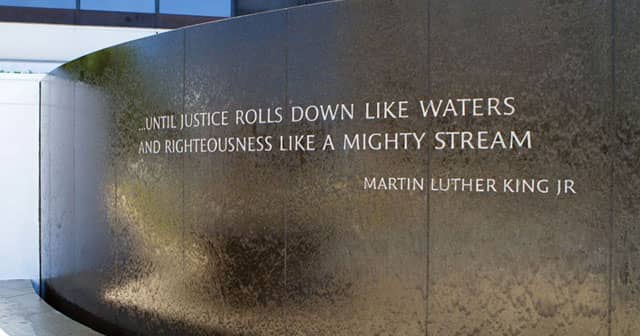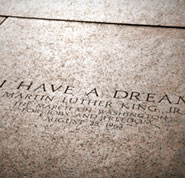
By Charles Gilmer
The persistence of America's racism remains a serious challenge to our hope for a nation that lives out its most cherished values - liberty and justice for all.
Continued incidents, which stir racial tensions, remind us that hatred and animosity still fester. Suspicion lurks under the surface of many interactions. News events repeatedly remind us of the illusory and fragile nature of racial harmony in the United States of America.
We seem to live under an uneasy truce.
 It has been many decades since the 1963 March on Washington where Martin Luther King's "I Have a Dream" speech was delivered. Yet none of us can say that our nation has fully lived up to Dr. King's vision of a land where each person would be judged by the content of their character, rather than the color of their skin.
It has been many decades since the 1963 March on Washington where Martin Luther King's "I Have a Dream" speech was delivered. Yet none of us can say that our nation has fully lived up to Dr. King's vision of a land where each person would be judged by the content of their character, rather than the color of their skin.
Tensions continue, and regularly we hear of yet another incident somewhere in our country where race is presented as a precipitating factor.
Things are different today than they have been in the past. Yet the question remains, why has it been so difficult for us to embrace and consistently live out Dr. King's dream?
In the wake of the civil rights movement in which Dr. King was so dramatically used, there came a flood of social programs that sought to address the causes and consequences of racism. Cultural education, cross-cultural dialogue, and the current multi-culturalism all hearken back to the civil rights movement for their mandates.
In the pursuit of the rights of various groups, under the civil rights umbrella, one thing has become clear. That which was called right by one group is often called wrong by another. Rather than resolving the differences, tolerance is championed as the appropriate response to the varying perspectives that have emerged.
Tolerance has no cohesive or healing power in society. It means little more than leaving one another alone. It leads to indifference, not understanding. Tolerance allows the gulfs between us to remain in place. In fact, there is little in the concept of tolerance to pull us away from racial isolation.
Tolerance brings with it an implicit moral relativism. Who is to say what is right and what is wrong? Moral relativism suggests that there are no absolutes to which we can all be held accountable. Such a thing was far from the thinking of Martin Luther King. In one of his works Dr. King makes the following statements:
"At the center of the Christian faith is the affirmation that there is a God in the universe who is the ground and essence of all reality. A Being of infinite love and boundless power, God is the creator, sustainer, and conserver of values…. In contrast to ethical relativism, Christianity sets forth a system of absolute moral values and affirms that God has placed within the very structure of this universe certain moral principles that are fixed and immutable."
Dr. King did not speak in terms of tolerance. His ideal was love.
"Hate cannot drive out hate, only love can do that."*
Yet, in current discussions of race relations the word love is seldom mentioned. Dr. King insisted love was the dominant or critical value by which we could overcome racial strife.
The love he spoke of was a biblical love, one that is unconditional, unselfish and seeks the absolute good of another party. That kind of love is a tough love, one that confronts wrong and injustice with the truth – absolute truth as decreed by an all-powerful God and enables the individual to love their enemy.
As we consider giving new life to "The Dream," we have to acknowledge that, in Dr. King's speaking and writing, "The Dream" does begin with God. For without God, there is no absolute transcendent truth on which to base a call to justice. Nor is there any source from which to draw the strength to love about which he spoke.
A certain degree of skepticism about this perspective is understandable. Too often, those who claim to be Christians have failed to live in keeping with the clear teachings of the Christian Scriptures. These failures have frequently been in matters of race.
It is clear from the Bible (and Dr. King affirmed) that the church ought to provide spiritual and moral leadership in society. However, as we observe the history of the American church, many parts of it have been passive, or even regressive, in matters of race. Even in the current era, the church speaks to the issues of the day with a fragmented voice.
 A case in point is the tendency for African-American clergy to align with Democratic candidates, while many white pastors align with Republicans. Yet, Dr. King implored people not to dismiss Christianity on the basis of these observations.
A case in point is the tendency for African-American clergy to align with Democratic candidates, while many white pastors align with Republicans. Yet, Dr. King implored people not to dismiss Christianity on the basis of these observations.
Dr. King lived in an era when the leadership of the church in addressing racism was even less credible than it is today. Dr. King clearly understood that too often there was a difference between what Christianity taught in the Bible and the varieties of Christianity observed around him.
Despite Dr. King’s commitment to peaceful protest to address systemic injustices, he began receiving threatening letters and phone calls. In the middle of the night, one especially ugly phone call unnerved him.
“It seemed that all of my fears had come down on me at once.”
He got up, went to the kitchen to make coffee, struggling with exhaustion, fear and sensing a complete loss of courage. He began praying, “I am here taking a stand for what I believe is right. But now I am afraid. The people are looking to me for leadership. I am at the end of my powers. I have nothing left.”
He said God responded with an awareness of God’s presence as he had never sensed before. He said it was as if God spoke to his heart saying, “Stand up for righteousness. Stand up for truth. God will be at your side forever.”
Dr. King said that in that instance his fears passed from him. Certainty took over and he was ready to face anything. “The outer situation remained the same, but God had given me inner calm.”*
His life was devoted to challenging this nation to live out a more consistent obedience to the moral absolutes of the Bible. His repeated plea was for men and women to enter into the kind of personal relationship with God that transcended that which could be seen and that which was being experienced.
Hear Dr. King as he speaks to the man or woman who contends that God is unnecessary or irrelevant to our modern lives:
"At times we may feel that we do not need God, but on the day when the storms of disappointment rage, the winds of disaster blow, and the tidal waves of grief beat against our lives, if we do not have a deep and patient faith, our emotional lives will be ripped to shreds.
"There is so much frustration in the world because we have relied on gods rather than God. We have genuflected before the god of science only to find that it has given us the atomic bomb, producing fears and anxieties that science can never mitigate.
"We have worshiped the god of pleasure only to discover that thrills play out and sensations are short-lived. We have bowed before the god of money only to learn that there are such things as love and friendship that money cannot buy and that in a world of possible depressions, stock market crashes, and bad business investments, money is a rather uncertain deity.
"These transitory gods are not able to save us or bring happiness to the human heart. Only God is able. It is faith in him that we must rediscover. With this faith we can transform bleak and desolate valleys into sunlit paths of joy and bring new light into the dark caverns of pessimism."*
 Are you discouraged about the prospect of us never overcoming the racial divisiveness that permeates this nation? Or are you frustrated by your inability to genuinely love others who are different from you? Martin Luther King recommended faith in Jesus of Nazareth as antidotes for both maladies.
Are you discouraged about the prospect of us never overcoming the racial divisiveness that permeates this nation? Or are you frustrated by your inability to genuinely love others who are different from you? Martin Luther King recommended faith in Jesus of Nazareth as antidotes for both maladies.
"Evil can be cast out, not by man alone nor by a dictatorial God who invades our lives, but when we open the door and invite God through Christ to enter. 'Behold, I stand at the door, and knock; if any man hear my voice, and open the door, I will come in to him, and will sup with him, and he with me.' God is too courteous to break open the door, but when we open it in faith believing, a divine and human confrontation will transform our sin-ruined lives into radiant personalities."*
A relationship with God gives us the power to overcome whatever sin we may be struggling with, including the sin of racism. Racism stands not only as a barrier between people, but as an offense between us and God. The reason Dr. King could recommend Christ as a solution to the problem of racism is Jesus' death on the cross paid the price for all of our sins. He then rose from the dead and now offers us the forgiveness of God and the power to live new lives. Dr. King put it this way:
"Man is a sinner in need of God's forgiving grace. This is not deadening pessimism; it is Christian realism."*
Our need for Jesus is truly the great equalizer of the races. We all are sinners in need of a Savior. We all stand before God, not on the basis of one race's superiority over another, morally, culturally, financially, politically, or in any other way.
All the races of the world, all the cultures of the world, need the same Savior. His name is Jesus.
What Martin Luther King described as our need for a "divine and human confrontation" is offered at God's initiative. It requires placing our faith in what Jesus did as our own personal payment for sin, and inviting Him to enter our lives "when we open the door and invite God through Christ to enter."
Dr. King's words still ring true today. We can give new life to "The Dream," following the path of Dr. King. Our path may not lead to martyrdom by an assassin's bullet as it did for Martin Luther King, but it does lead to dying to our selfish ways and self-sufficiency. Such a faith is not a weak-kneed, escapist religious exercise, but a courageous pursuit of that which is ultimately good, right and true.
"In his magnanimous love, God freely offers to do for us what we cannot do for ourselves. Our humble and openhearted acceptance is faith. So by faith we are saved. Man filled with God and God operating through man bring unbelievable changes in our individual and social lives."*
"The Dream" starts with God as revealed through His Son, Jesus Christ. Through a relationship with Him, we can be agents of healing in a world that is sick with racial and ethnic conflict. Won't you seriously consider placing your faith in Christ, as Dr. Martin Luther King Jr. did? God offers us this relationship with Him, and we simply respond:
Jesus Christ, I invite you to come into my life, to forgive me of my sin, to give me a new relationship with you. Bring into my heart your love and your power to love others. Thank you for transforming my life right now.
If you have surrendered to Jesus Christ, pray for a life-changing faith and a growing dependence on Him. Only He can bring into our hearts His supernatural love and the power to love others.
As God transforms our lives, we have the potential to embody that which Martin Luther King dreamed… an end to racism in America.
| ► | I just asked Jesus into my life (some helpful information follows)... |
| ► | I may want to ask Jesus into my life, please explain this more fully... |
| ► | I have a question or comment... |
 Charles Gilmer is the Founding and Past President of The Impact Movement, Inc., a partner ministry with Cru, which takes the truth of Jesus Christ to the campus, the community and the world by producing leaders of African descent who are spiritually focused, financially responsible and morally fit. He has spoken on campuses across the US and in Africa on race relations, missions and the Christian faith. He is a graduate of the University of Pennsylvania, Princeton Theological Seminary, and has been honored with a Doctor of Divinity degree by Carver Bible College. Charles is currently a PhD student and Teaching Fellow at Duquesne University. He and his wife, Rebecca, have six children and thirteen grandchildren.
Charles Gilmer is the Founding and Past President of The Impact Movement, Inc., a partner ministry with Cru, which takes the truth of Jesus Christ to the campus, the community and the world by producing leaders of African descent who are spiritually focused, financially responsible and morally fit. He has spoken on campuses across the US and in Africa on race relations, missions and the Christian faith. He is a graduate of the University of Pennsylvania, Princeton Theological Seminary, and has been honored with a Doctor of Divinity degree by Carver Bible College. Charles is currently a PhD student and Teaching Fellow at Duquesne University. He and his wife, Rebecca, have six children and thirteen grandchildren.
*Excerpts taken from Strength to Love, by Dr. Martin Luther King, 1963.
Other articles/videos you might be interested in…